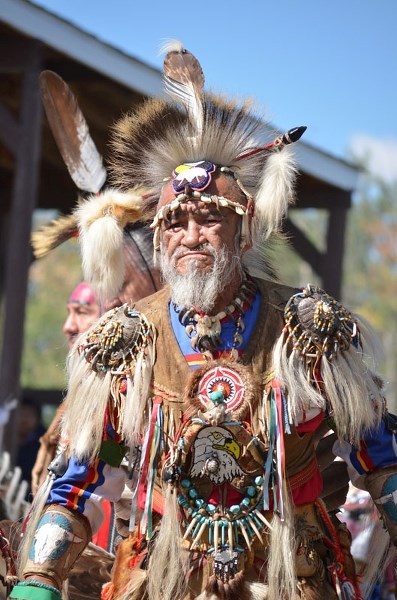Last week marked the 138th anniversary of the signing of Treaty 6 by the Alexander First Nation.
Signed by Chief Catchistahwayskum on Aug. 21, 1877 in Fort Edmonton, the treaty established land, cash, medical, hunting and fishing and agricultural rights for the Plain and Woodland Cree nations of central Alberta and Saskatchewan.
“We, as native people, take this day in high regards, because it’s what built us to where we are today,” said Chief Kurt Burnstick, during the community’s Treaty Day celebration on Friday afternoon.
In honour of the historical day, the chiefs of the nations within Treaty 6 met briefly with Premier Rachel Notley.
Burnstick said that the meeting with the premier was “too short,” but he looks forward to sitting down with her in the upcoming months.
During her campaign run in spring of 2015 Notley expressed her intent to develop better relationships with First Nations, promising to ensure better consultation and protect treaty rights.
“It’s very significant, knowing that the province never did that before,” Burnstick said.
He said it is important to educate younger people about native rights.
Chief Isaac Laboucan-Avirom, who was visiting from the Woodland Cree First Nation, said there needs to be better education on aboriginal issues such as treaties within the curriculum.
There are really big misconceptions about how settlers “took over” or “stole” lands from First Nations, he said, when in fact treaties were signed in strength to ensure lasting rights for aboriginal peoples such as the Plains and Woodland Cree of Alberta.
In 1870, the land between the Great Lakes and the Rocky Mountains – formerly under the rule of the Hudson’s Bay Company – was taken over by the Dominion of Canada.
When word reached aboriginals that their land had been ‘sold’ to Canada, they began to worry about the implications of settlement and sought to protect their interests through treaties – a process which had been successful in avoiding major conflicts between settlers and First Nations in Ontario and Quebec throughout the 1850s.
These land cessation treaties, known as the Robinson Treaties, stripped aboriginals of their land titles, but granted them a cash lump sum, an annual cash gratuity and the right to fish and hunt in the territory they ceded, except on lands that were subsequently leased or sold.
Treaty 6 was created in much of the same spirit. Worried about smallpox and the diminishing number of buffalo, the Plains and Woodland Cree negotiated additional agricultural implements to ensure their future economic survival.
They also included a medicine chest clause requiring the Indian agent to keep a medicine chest in his house, which is seen now as implying full health-care benefits for First Nations.
But those rights that were agreed upon, and at times heavily negotiated, are slowly deteriorating, said Laboucan-Avirom. For example, the $5 annuity promised in 1876 could buy you a few acres of land. Now it doesn’t go too far.
Victoria Arcand, a former chief and council member for Alexander First Nation, said that other than health care and education, aboriginals have lost many of their treaty rights – and even those continue to be eroded by federal government.
“The big issue is with the teeth,” said Arcand. “I was really upset. Not long ago, I was in a lot of pain; I needed to get a root canal and they wouldn’t approve it because I had one done two years ago. I said ‘You want all the Indians to be toothless?’ ”
To deal with these issues, Alexander First Nation has created a treaty protection office, which collects treaty-related documents and monitors discussions on treaty right issues, such as non-insured health benefits and better access to education.
Chief Burnstick said the focus of his discussion with Notley will focus on these key points of contention.
He is hopeful that the NDP will be able to effect change at the federal level on their behalf.




